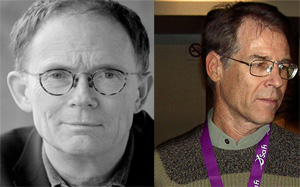Orwell Wrote Other Books Besides 1984, You Know
We haven’t had a “Maslin Watch” here in ages, because life is too short to put myself through that kind of torture on a regular basis, but her review of the new John Twelve Hawks novel snuck up on my RSS reader with its craziness:
“When a series starts off as excitingly as John Twelve Hawks’s Fourth Realm Trilogy did, readers are apt to cut the author’s next installments a little slack. After all, once an imaginary world springs full-blown from a writer, follow-up fatigue is to be expected. It’s natural to find an author ensnared by his own fanciful creations. Having leapt so high in the first place, the writer is left facing a steep climb.”
I’m like, hello? We’re talking about the same John Twelve Hawks, right? The one with the debut novel that most critics agreed was pretty god-awful? But then I realized, Janet Maslin isn’t most critics. Although she’s not working particularly hard at it, either: The Traveler was described as “a true Orwellian synthesis of the world’s ills,” and for her review of The Dark River, she goes on about the “red-hot Orwellian paranoid fantasies” Twelve Hawks crafts. Here’s a tip for the copyeditor at the Times desk: if a book reviewer calls something “Orwellian,” you don’t need to clarify that with “paranoid.” And a tip for Maslin: There are other authors in the world who deal with the oppressive condition of modern existence.
26 July 2007 | uncategorized |
Sci-Fi Speaks to Our Modern Condition
 In an interview with The College Crier a month before his new novel, Spook Country, comes out, William Gibson (left) speaks to the cyberpunk world we live in. “When I was writing a novel like Count Zero I would just invent some other level of imaginary technology or invent some part of the back story of my future history that would account for me having a way to scoot past that bit of illogic in the story,” he reflects. “When you’re writing about a present, whether it’s imaginary or not, and there’s some major imaginary elements in Spook Country, the rules are different… I have to come up with something that allows me to suspend my disbelief in my fantastic narrative and which I hope will allow the reader to suspend their disbelief. So actually, it is more work.”
In an interview with The College Crier a month before his new novel, Spook Country, comes out, William Gibson (left) speaks to the cyberpunk world we live in. “When I was writing a novel like Count Zero I would just invent some other level of imaginary technology or invent some part of the back story of my future history that would account for me having a way to scoot past that bit of illogic in the story,” he reflects. “When you’re writing about a present, whether it’s imaginary or not, and there’s some major imaginary elements in Spook Country, the rules are different… I have to come up with something that allows me to suspend my disbelief in my fantastic narrative and which I hope will allow the reader to suspend their disbelief. So actually, it is more work.”
Meanwhile, Kim Stanley Robinson talks to Wired News about the real-world environmental concerns that propel the trilogy of near-future political novels that recently concluded with Sixty Days and Counting. “I’m hoping the scientific community continues to go off like a fire alarm in a hotel, just as they have for the last five years, and that that will do the trick. If they do, the democracies, the political leadership and even big business will all recognize that this is a real threat. And we’re seeing enough of the effects, even without catastrophic weather,” Robinson says. “Even India and China therefore have compelling reasons to get serious. Their own populations will be hammered by the loss of the Himalayan glaciers. So many effects are combining. I don’t think we need the kind of minus-50-degree winter I described in the books. “
9 July 2007 | uncategorized |

 Our Endless and Proper Work is my new book with Belt Publishing about starting (and sticking to) a productive writing practice.
Our Endless and Proper Work is my new book with Belt Publishing about starting (and sticking to) a productive writing practice. 
